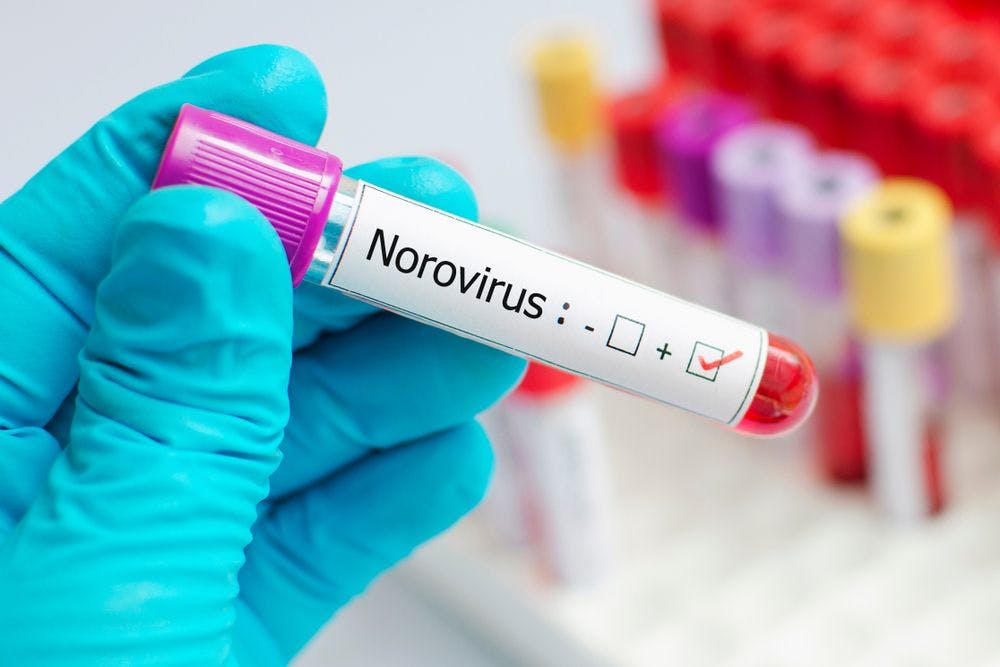Rise in Norovirus Cases For Over 65s: Guidance For Care Homes

Estimated Reading Time: 5 minutes
As the winter season continues, Norovirus cases are on the rise across the UK - especially in those 65 and over.
In the last few weeks, the number of Norovirus cases has surged by 66% compared to previous years, according to National Health Surveillance Data.
With this in mind, we’ve explained what Norovirus is, what the symptoms are and how to protect yourself and your loved ones from it, along with the policies and procedures care homes have in place to protect their residents.
Kickstart your care search
Discover the best care homes in your area through Lottie.
In this article:
- What is Norovirus?
- Symptoms
- Treatment
- How to protect yourself and your elderly loved ones
- Norovirus in care homes
What is Norovirus?
Norovirus (also known as the ‘winter vomiting bug') is a stomach bug which can cause vomiting and diarrhoea. The virus is easily spread through contaminated food, touching contaminated surfaces and having close contact with others. Norovirus is often more prominent in the winter months as we generally spend more time indoors.
It usually lasts for around two to three days.
The elderly are more likely to experience Norovirus - especially those living with dementia. Whilst the virus usually passes within a few days, older adults are at greater risk of experiencing complications such as dehydration and fatigue.
Our research has seen an increase in people turning to Google for Norovirus support and advice:
| Search Term | How Much More Are People Googling It? | Norovirus disease | + 300% |
|---|---|
| Post Norovirus symptoms | + 300% |
| Norovirus complications elderly | + 150% |
| Norovirus elderly | + 57% |
What Are the Norovirus Symptoms?
The most common symptoms of Norovirus include:
- Feeling nauseous
- Vomiting
- Diarrhoea
- Stomach pain
Other symptoms are:
- Fever
- Headaches
- Aching arms and legs
Norovirus Treatment
Unfortunately, there isn’t any way of treating Norovirus, meaning you have to let the illness run its course - usually over two or three days.
Drinking plenty of fluids and generally staying hydrated is a good way of easing symptoms.

Usually, you don’t need to get any medical advice. The main exception is if you or your loved one are displaying additional symptoms, as these could be part of a more serious problem.
How to Protect Yourself and Your Elderly Loved Ones From Norovirus
Keep your loved one hydrated
Vomiting and diarrhoea are common symptoms of Norovirus. As a result, dehydration is a common challenge for older people, especially for those with dementia, including people living in a dementia care home. They may not recognise the signs they need to drink more or be able to communicate their needs easily.
Make sure your loved one has regular drinks within easy reach so they can stay hydrated. For instance, place a jug of fresh, cold water in every room and in the places they spent most of their time, including next to their favourite chair.
Fruit and vegetables are also great sources of water for keeping your loved ones hydrated, including:
- Cucumbers
- Tomatoes
- Melons
- Oranges

Make sure your loved one is well rested
Norovirus can increase exhaustion and fatigue, so make sure your loved one is getting plenty of rest if they’re experiencing any symptoms of the virus.
Try to avoid any strenuous activities during the day and allow your loved one to take regular breaks to relax. If your loved one is living with dementia, try to avoid them taking a nap later in the day and any naps in the evening - this can disrupt their sleeping pattern, making it harder for them to fall asleep at night.
Help your loved one be as comfortable as possible
Headache, cramps and muscle pains can all be symptoms of Norovirus. If your loved one is experiencing any of these symptoms, you can offer them painkillers to help them feel more comfortable.
Try to ensure your loved one is as comfortable as possible. For example, propping them up with pillows and checking their temperature is at a reasonable level (around 37.5°C) will help them relax and recover.
Practise good hygiene
Norovirus is highly contagious and can be spread through close contact with those infected with the virus, so it’s important to keep up good hygiene practices to protect yourself or a loved one from contracting or spreading the virus.
Washing your hands regularly and using hand sanitiser when doing so is the single most important thing you can do. Disinfecting surfaces and tables and washing fruit and vegetables before eating them are all examples of good hygiene practices and can also help prevent the spread of Norovirus.
Norovirus in Care Homes
Care homes are provided with lots of advice and actions they should take to reduce the risk of Norovirus outbreaks. Recognising symptoms as early as possible will help prevent the virus from spreading.
Procedures and policies in place
There are various guides dedicated to explaining the policies and procedures that should be in place across various care settings - including care homes - in the event of a Norovirus outbreak.
We’ve provided some of these relevant to care homes in the UK below.
Norovirus Guidance for Care Homes - Health Protection Scotland
Norovirus Incidents and Outbreaks in Nursing and Residential Homes - Public Health Agency



